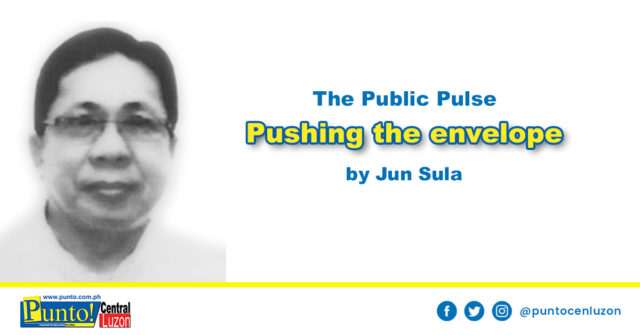If anything, apart from the much ballyhoed claim to fight terrorism more effectively, the anti-terror bill is clearly another way of pushing the envelope to constrict the democratic space.
The proponents off er it — no, ram it down people’s throat — as a take it or leave imeasure to combat terrorism. Take note that it was hastily passed– railroaded , according to those who know the rules, by both the Senate and the House of Representatives while everyone is distracted by the paralyzing adversities of the pandemic.
But concerned individuals and groups with unassailed reputation and proven expertise in the field of law are waving a red flag on the bill or portions of it, basically labelling it as patently unconstitutional.
Those who are behind the bill are assuring the public no end that there is nothing to fear about it, unless you are a terrorist, citing safeguards and all.
In an imperfect world, easy assurances are as good as their beneficent sources: imperfect and fl awed. When push comes to shove, the fine print is the ultimate arbiter.
The imposing Rufo Colayco, former head of the Clark Development Corp., used to remind his awed- and -shocked top managers to look for the fine print in any contract. The egghead from Harvard warned that, when the ship hits sand, everybody dives for the fine print.
Fine print gives the anti-terror bill away, or its utter disregard for or carelessness in protecting human rights, limbs and lives in that order.
One specific proviso of the bill has been reflagged by no less than retired Supreme Court justice Antonio Carpio for being patently unconstutional. That provision does away with the Court in determining probable cause and replaces it with an executive council of Cabinet members vested with the authority to issue arrest warrants and detain suspects.
This flagrant deviation, he says, throws a monkey wrench on check and balance in government, the bedrock of a democratic system. The role of the judge and executioner is assigned to one body, essentially the executive branch.
To add injury to insult, the detention period has been raised to 24 days from three days. And no bail, mind you. Draconian is the right word but monstrous will also suffice.
When you look closer, this new approach cuts at the heart of the Constitution, the bill of rights, which is deemed inviolable. The Charter is the gold standard, the anti-terror bill supporters obviously want a lower bar, a short cut, if you will.
Looming immediately on the pandemic horizon is not the ever rising COVID 19 cases feared to breach the 40,000 mark by the end of June. It’s the bill that needs just one signature to make it into a law, that of President Duterte. In fact, he doesn’t even have to sign it but let it attain a life of its own by leaving it untouched on his table.
But there’s faint indication that Malacanang may have doubts about the moral premise or the legal texture of the proposed measure, The curious disclaimer from the presidential spox is that the idea of an anti-terror bill did not come from the Palace’s principal tenant who has a little more than two years left to his contract with the Filipino people. ( Guess who certified it as urgent?)
Even then, that’s a flimsy sliver of a silver lining. It’s conventional wisdom that authoritarians rarely walk on their backfoot. They march on in history with their goosesteps executed with precision in long leather boots. Still, hopes springs eternal in the human breast.
There’s the Supreme Court, the last bulwark of democracy whose exclusive prerogatives, jurisdiction and territory are now threatened by the anti-terror bill by doing away with judges in issuing arrest warrants, among others.
Sen. Ping Lacson, who authors the bill, says he will join the protest if abuses are committed in implementing the law in mind. Fine, thank you. But too late the hero in the making. What good would that do when harm , hopefully not costly and irreparably, has been inflicted on innocent people? At the very least, this kind of statement doesn’t seem to have the benefit of hindsight of police history, Philippine setting.
It’s also a good thing that some lawmakers and major business and professional groups are up in arms against this bill. Between them , Carpio, Vice President Leni Robredo and the Integrated Bar of the Philippines , and those who want the law pronto , the choice is nobrainer. It’s as easy as separating the sheep from their wool-less cousins.
One senator was even in the news waving the anti-terrro bill as a deterrent to those who he said have been disrespecting government officials like him. And they say the bill will not run against free speech and dissent? The devil is in the detail of the bill.
In the meantime, the Philippine economy is in the doldrums, millions are out of work, poverty is projected to worsen and the COVID 19 crisis is still excruciatingly upon us. Vice President Robredo is on the money when she wonders the kind priorities that the current administration has in the next two years its term?
Carpio has a window out of the myriad mess that we’re in: choose wisely in 2022. That’s not too far off . The champion of the West Philippine Sea suggests that the issue be part of the election campaign. Unless , of course , the antiterror bill preempts that.
That’s the ultimate rub.





